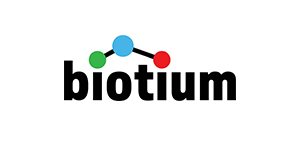HSP60 (Heat Shock Protein 60) (Mitochondrial Marker) (HSPD1/2206R), CF740 conjugate, 0.1mg/mL
HSP60 (Heat Shock Protein 60) (Mitochondrial Marker) (HSPD1/2206R), CF740 conjugate, 0.1mg/mL
SKU
BTMBNC742206-500
Packaging Unit
500 uL
Manufacturer
Biotium
Availability:
loading...
Price is loading...
Description: This antibody recognizes a 60 kDa protein, identified as the heat shock protein 60 (hsp60). Its epitope is localized between aa 383-447 of human hsp60. A wide variety of environmental and pathophysiological stressful conditions trigger the synthesis of a family of proteins known as heat shock proteins (HSPs), more appropriately called as stress response proteins (SRPs). hsp60 is a potential antigen in a number of autoimmune diseases. In human arthritis and in experimentally induced arthritis in animals, disease development coincides with the development of immune reactivity directed against not only bacterial hsp60, but also against its mammalian homolog. Clone HSPD1/2206R, unlike LK2, recognizes only the mammalian (not bacterial) hsp60 and is useful in distinguishing hsp60 from mammals and bacteria.Primary antibodies are available purified, or with a selection of fluorescent CF® Dyes and other labels. CF® Dyes offer exceptional brightness and photostability. Note: Conjugates of blue fluorescent dyes like CF®405S and CF®405M are not recommended for detecting low abundance targets, because blue dyes have lower fluorescence and can give higher non-specific background than other dye colors.
Product origin: Animal - Oryctolagus cuniculus (domestic rabbit), Bos taurus (bovine)
Conjugate: CF740
Concentration: 0.1 mg/mL
Storage buffer: PBS, 0.1% rBSA, 0.05% azide
Clone: HSPD1/2206R
Immunogen: Recombinant full-length human HSP60 protein
Antibody Reactivity: HSP60
Entrez Gene ID: 3329
Z-Antibody Applications: IHC, FFPE (verified)/WB (verified)
Verified AB Applications: IHC (FFPE) (verified)/WB (verified)
Antibody Application Notes: Higher concentration may be required for direct detection using primary antibody conjugates than for indirect detection with secondary antibody/Immunohistology (formalin): 0.5-1 ug/mL for 30 minutes at RT/Staining of formalin-fixed tissues is enhanced by boiling tissue sections in 10 mM citrate buffer pH 6.0 for 10-20 minutes followed by cooling at RT for 20 minutes/Western blotting 0.25-0.5 ug/mL/Optimal dilution for a specific application should be determined by user
Product origin: Animal - Oryctolagus cuniculus (domestic rabbit), Bos taurus (bovine)
Conjugate: CF740
Concentration: 0.1 mg/mL
Storage buffer: PBS, 0.1% rBSA, 0.05% azide
Clone: HSPD1/2206R
Immunogen: Recombinant full-length human HSP60 protein
Antibody Reactivity: HSP60
Entrez Gene ID: 3329
Z-Antibody Applications: IHC, FFPE (verified)/WB (verified)
Verified AB Applications: IHC (FFPE) (verified)/WB (verified)
Antibody Application Notes: Higher concentration may be required for direct detection using primary antibody conjugates than for indirect detection with secondary antibody/Immunohistology (formalin): 0.5-1 ug/mL for 30 minutes at RT/Staining of formalin-fixed tissues is enhanced by boiling tissue sections in 10 mM citrate buffer pH 6.0 for 10-20 minutes followed by cooling at RT for 20 minutes/Western blotting 0.25-0.5 ug/mL/Optimal dilution for a specific application should be determined by user
| SKU | BTMBNC742206-500 |
|---|---|
| Manufacturer | Biotium |
| Manufacturer SKU | BNC742206-500 |
| Package Unit | 500 uL |
| Quantity Unit | STK |
| Reactivity | Human, Mouse (Murine), Rat (Rattus), Pig (Porcine), Sheep (Ovine), Monkey (Primate), Rabbit, Dog (Canine), Cow (Bovine), Hamster, Chicken |
| Clonality | Recombinant |
| Application | Western Blotting, Immunohistochemistry |
| Isotype | IgG |
| Host | Rabbit |
| Conjugate | Conjugated, CF740 |
| Product information (PDF) | Download |
| MSDS (PDF) | Download |

 Deutsch
Deutsch







